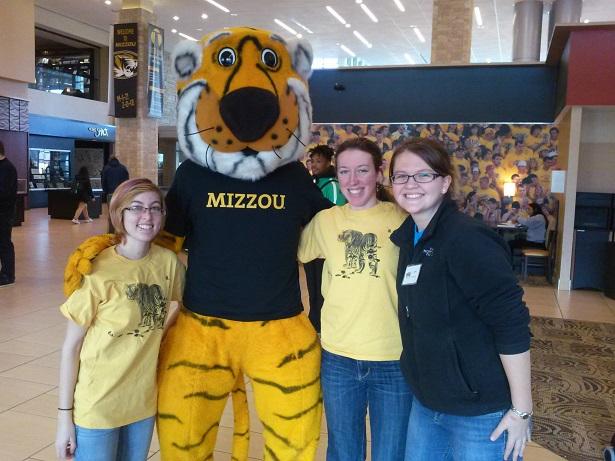
Since 1890, the mascot of MU has been the tiger, worn proudly on students’ clothes, flaunted at football games and made a symbol of what the school stands for. Yet while students roam the campus clad in tiger gear, the amount of tigers in the wild has been diminishing, leaving them endangered.
One club on campus, called Tigers for Tigers, aims to protect this species by making donations to habitat restoration foundations and zoos, volunteer at zoos and tiger sanctuaries and educate the public on what they can do to prevent the extinction of tigers as a whole.
Member Jessica Allen has been an avid tiger fan since even before she began attending MU and says that most students on campus, though they are all MU tigers, know little about the animal itself.
“We’re a tiger mascot place, and yet nobody can tell you how many tigers are in the wild or where their natural range is, and I feel like that’s necessary,” Allen said. “[It would] be really interesting to go around, say, ‘Hey, what do you know about tigers?’ and most likely, [students] can’t even tell you the basic stuff … so it’s one of those things where everybody is like, ‘Oh my god, I would so love to take a picture with a tiger,’ but they need to understand the background history on these things.”
“Working to ensure there will be wild tigers as long as there are Mizzou tigers” is the club’s motto, said club president Shannon McKinley. One way this is accomplished is through visits to local elementary schools, a job done by Allen as the education chair officer for two years. Passing a bitten bowling ball and imitation tiger claw around the room, Allen presented both difficult truths, such as habitat fragmentation, and fun facts, like how tigers like to swim, to the classrooms of children. By the end, they would create their own tiger masks, each with a unique pattern of stripes, just like wild tigers possess.
“I mainly taught [the students] about conservation. A big thing that came up was soybean oil, so sustainably buying products, which, as you know, with kids, it’s really hard to nail what that means, so my goal was to try and dim it down and say basically, people are cutting down trees and they’re not putting them back up and it’s causing massive habitat fragmentation for these tigers,” Allen said. “It was really fun [to visit] and [the kids] all enjoyed it … and the teachers really enjoyed bringing in that conservation because really, you don’t get much experience with that when you’re a kid.”
Education, however, isn’t all Tigers for Tigers does; it also presents unique opportunities for its members in terms of volunteering. From participating in habitat enrichment with their own scents to watching practice blood draws performed on the tigers, Allen said the group has offered her many great experiences.
“That’s what we really want to provide the students who are coming with us [with]: we want to provide them with the opportunity to see tigers and interact with them and learn more about this species that we really don’t get to see much of because they’re exotic. And so my goal as an event coordinator was just to get them those experiences that they wouldn’t get anywhere else while also volunteering,” Allen said. “These are experiences that we get that nobody would really ever get anywhere else.”
Tigers for Tigers works with multiple tiger sanctuaries, spanning from local to national, including Dickerson Park Zoo, National Tiger Sanctuary and Cedar Cove. Allen said Dickerson Park Zoo is one the group works especially closely with, and, according to the zoo’s website, MU committed to sponsoring the zoo’s tiger exhibit for five years at $10,000 per year. They also offer special opportunities for members of the club.
“Dickerson Parks Zoo, they provide facilities on-site, so if we need to stay the night, we can do that for free, which was really nice, especially considering it’s a three to three and a half hour drive to get there in Springfield,” Allen said. “They are also really, really nice people to us. We’ve been contributing some to them, and they, in turn, give back to us as well. So they will also … get us to the keeper who deals with those animals on a daily basis so we can ask them questions and interact with the animals if possible, just to get more experience with what we’re interested in. It’s really great.”
McKinley said this club is not only about the tigers, but also about the people in it, as it’s a close-knit group of only 20 members. However, the club really finds itself in advocating for the animals found on every logo for MU, hoping that the mascot will not someday become extinct.
“I think it’s really important to understand what we’re proud of,” Allen said. “Our mascot and our name, Mizzou, we’re really proud of it, but behind the scenes, we don’t really understand tigers, and I think that’s something [students] should be aware of and it’s something they should understand, if not contribute in a way.”
Tigers for Tigers meets every other Monday at 6 p.m. in the MU Student Center St. Louis and Kansas City room.
_Edited by Siena DeBolt | [email protected]_